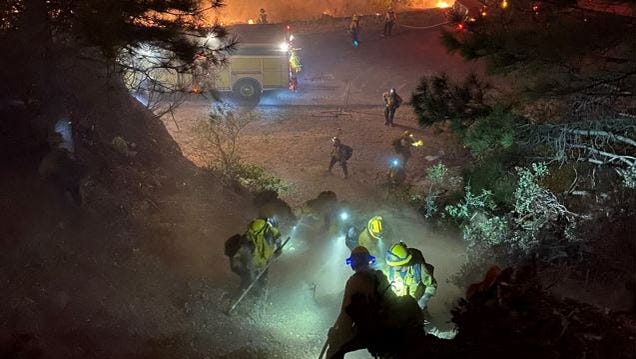The Mosquito Fire became the largest wildfire to burn in California this year after growing over 63,000 acres Wednesday night, fueled by dried vegetation in an area that was cooling off after record-breaking heat last week.
The massive fire has been burning for more than a week since it ignited on Sept. 6. It has spread over 14,000 acres since Tuesday. As of Wednesday night, the fire now covers over 63,000 acres in El Dorado and Placer counties, according to the California Department of Forestry and Fire Protection (Cal Fire).
While the blaze calmed down over the weekend, strong winds cleared up smoke and created fresh oxygen for active fire behavior Tuesday night, Cal Fire said. Containment dropped from 25% Tuesday to 20% on Wednesday.
Fire behavior on the east end is expected to increase as winds push the fire into critically dry fuel.
“We’re ready for an absolute blowup out here,” said Jonathan Pangburn, a fire behavior analyst with Cal Fire, during the US Forest Service’s Wednesday briefing. “It doesn’t need a lot of wind.”
The Mosquito blaze surpassed the McKinney fire as the largest wildfire in California this year. The McKinney fire has burned over 60,000 acres in Siskiyou County and is currently 99% contained.
‘END OF THE DREAM’:Billboards depict California’s drought, wildfire, housing crisis
Hazardous conditions in Northern California and Nevada
Over 11,000 residents of surrounding California communities were evacuated due to the Mosquito fire, according to Cal Fire. The towns of Foresthill, Michigan Bluff, Georgetown, and Volcanoville remained under mandatory evacuation as of early Wednesday.
The fire has destroyed 64 structures and damaged 10 in Placer and El Dorado counties, according to Cal Fire’s most recent damage assessment report. Over 9,000 structures were under threat.
Smoke from the Mosquito Fire hangs over Northern California, creating unhealthy air quality in the region and Nevada.
Public school officials in Reno and Sparks, Nevada, closed most campuses to in-person instruction Wednesday. Washoe County School District officials cited current hazardous air quality, National Weather Service projections, and the potential harm to vulnerable students and those who walk or bike to school.
The University of Nevada, Reno, and Truckee Meadows Community College also canceled in-person classes Wednesday but said online classes and essential services would continue.
WILL IT GET WORST? YES, EXPERTS SAY:Nearly half the US has endured a drought in 2022. Will it get worse? Yes, experts say.
Historic drought, record heat waves fuel dry conditions for wildfires
A historic drought has impacted much of the West and recent sweltering heat waves have further dried vegetation in the area. The extremely dry vegetation is known as critically dry fuel and fire officials warned that these conditions can easily spark a fire.
Pangburn recalled the King fire in 2014, where similar conditions occurred and noted that firefighters were forced to use emergency fire shelters due to fast-moving flames.
“Not wind-driven events, just fuel that was primed and ready, and decided to get up in a hurry,” Pangburn said during the Wednesday briefing.
Contributing: The Associated Press


